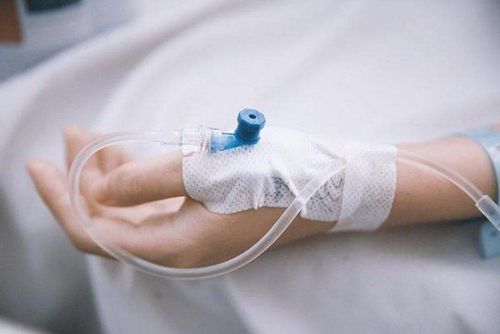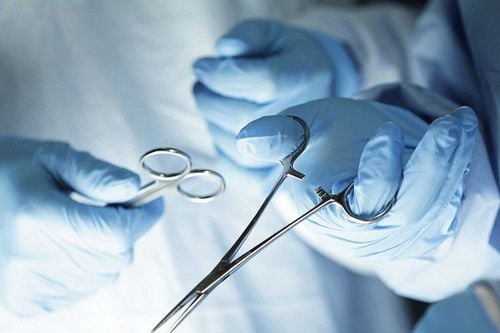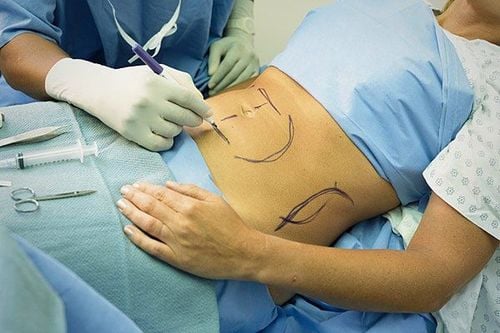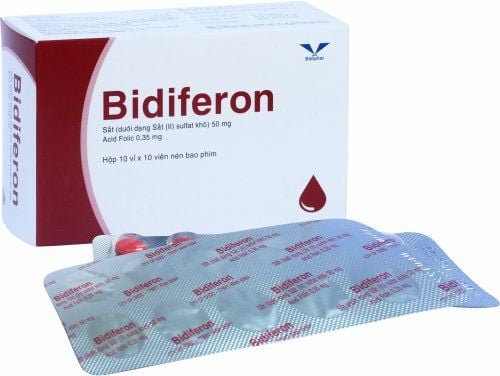This is an automatically translated article.
The article is written by MSc Nguyen Ngoc Khanh - Head of Department of Gastroenterology - Urology - Robotic Surgery & Pediatric Surgery, and MSc Nguyen Hung Cuong - Gastroenterologist, Vinmec Times International General Hospital City.Gastric surgery is performed by making a long incision on the abdomen (if open surgery) or several small incisions on the abdomen to insert surgical instruments during surgery (if laparoscopic surgery), in order to remove the stomach. sick stomach. Regardless of the treatment goal, the patient before gastric surgery needs to know important information.
1. Message for the patient
Fasting is very important. It concerns surgical safety and makes it possible for the physician to delay or cancel the patient's surgery. Patients can ask the surgeon or anesthesiologist any questions upon admission. The patient must sign the consent for surgery before surgery (can be signed before or during admission). Bring all medications and packages the patient takes (including patches, creams, inhalers, insulin, herbs) and any medical information related to medical care, such as X-rays- optics, test results. Take medication as usual on the day of surgery, unless the patient has been told not to take specific medication from the medical staff. If you have any questions about this surgery, contact the medical facility that performed the surgery.
2. Who will perform gastric bypass surgery?
Gastric surgery will be performed by an appropriately experienced surgeon - usually a specialist surgeon.3. Brief information about gastric surgery
Detailed, specific information related to your disease will be provided by the surgeon. But there are some brief information about the process during and after surgery you need to know to actively coordinate with your doctor and improve treatment efficiency:
Gastrectomy is indicated for some diseases of the stomach. such as: Stomach cancer, bleeding ulcers, gastric stricture that medical treatment does not improve. The surgeon can make an incision by making a long incision in the abdomen (open surgery) or several small incisions in the abdomen to insert surgical instruments during the operation (called laparoscopic surgery). The diseased part of the stomach will be removed. The patient will sleep before and during the surgery. The main function of the stomach is to store and mix food, where the structure of food permeable to gastric juices will be broken down before being pushed down to the small intestine and absorbed here. The most noticeable thing after surgery is that each meal you are no longer able to eat as much as before, you will be full quickly and will feel uncomfortable if you try to eat more. However, this depends on the volume of stomach removed and the body gradually adapts to the change by eating small meals. During the entire surgery, anesthetic is also given through a small plastic tube outside the spinal cord. The purpose of this anesthetic is similar to that of a dentist, only it is done to help the patient no longer feel pain in the abdomen. This method of anesthesia will also be used after surgery to reduce the pain of the incision.

Bệnh nhân mắc bệnh ung thư dạ dày được chỉ định cắt dạ dày
4. What should be examined before gastric surgery?
Before surgery, you need to go to the outpatient clinic. Here, the doctors will ask for your detailed medical history, perform the necessary clinical and laboratory examinations for surgery. You can ask your doctor any questions about surgery, and don't be afraid to discuss any concerns you have. You will probably have to do a blood test kit, chest X-ray and electrocardiogram, computed tomography scan, and endoscopy of the stomach and colon if your doctor deems it necessary. The doctor will ask if the patient is taking any other medications prescribed by the doctor or bought over the counter at the pharmacy. Bring all medications and packs (if available). This surgery involves sedation/anesthesia. The anesthesiologist will explain the methods of sedation/anesthesia and sedation. The clinic nurse will schedule an appointment with the anesthesiologist, nutritionist, and rehabilitation physician if needed.
5. Prepare before stomach surgery
The patient will be admitted to the hospital the day before gastric bypass surgery normally around 3pm. You will see doctors and nurses at the hospital. This is the final pre-surgery preparation, which may include taking blood for testing, checking blood pressure... to make sure the patient is safe for surgery. If your doctor does not recommend fasting, you can eat and drink normally that day. After dinner you can drink special drinks high in sugar (carbohydrates).
On the day of surgery, the patient is not allowed to eat or drink at least 6 hours before surgery. During the day, you will have your colon cleansed using an enema.
Is hair removal necessary before gastric surgery?
For most surgeries, you do not need to remove the hair around the surgical site. However, if this is necessary, the hair will be removed on the day of surgery.
You should not wax yourself or use a razor, as this may increase the risk of infection.
Stomach surgery at Vinmec Times City International General Hospital is performed by a team of well-trained and experienced doctors and nurses, with the support of a system of modern equipment to help minimize the risk. the risk of complications after surgery, bringing health and peace of mind to the patient.

Bệnh nhân không được ăn, uống ít nhất 6 giờ trước mổ dạ dày
Especially, from October 2019, in order to improve treatment quality, improve service access as well as patient experience, Vinmec Times City International General Hospital put into operation the model. Gastrointestinal Service Line (Gastrointestinal Service Line). This is a model that has been applied in many prestigious medical centers around the world.
Patients who visit and receive treatment according to the Gastrointestinal Service Line model will enjoy the following benefits:
Consult and agree on a comprehensive treatment plan from a team of doctors from many specialties, instead of just having a doctor. a primary care physician or a treatment specialty as usual; The development of an optimal treatment regimen helps patients avoid having to test different treatment methods, which is costly, time consuming and affects the overall effectiveness of treatment; Patients can better manage costs thanks to a one-time payment. For detailed advice on the Gastrointestinal Service Line model at Vinmec Times City, please contact HOTLINE 0243 9743 556 or book online HERE.














